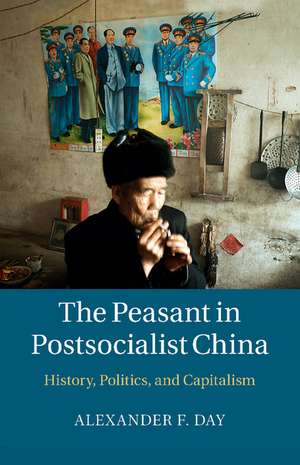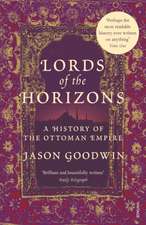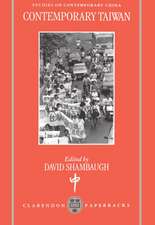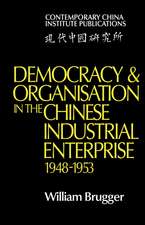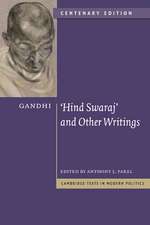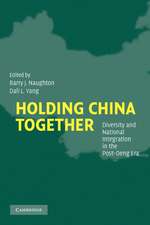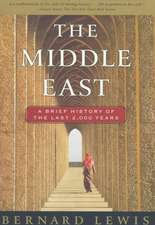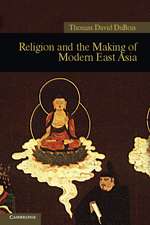The Peasant in Postsocialist China: History, Politics, and Capitalism
Autor Alexander F. Dayen Limba Engleză Paperback – 4 mar 2015
| Toate formatele și edițiile | Preț | Express |
|---|---|---|
| Paperback (1) | 282.48 lei 6-8 săpt. | |
| Cambridge University Press – 4 mar 2015 | 282.48 lei 6-8 săpt. | |
| Hardback (1) | 693.36 lei 6-8 săpt. | |
| Cambridge University Press – 17 iul 2013 | 693.36 lei 6-8 săpt. |
Preț: 282.48 lei
Nou
Puncte Express: 424
Preț estimativ în valută:
54.06€ • 56.10$ • 45.18£
54.06€ • 56.10$ • 45.18£
Carte tipărită la comandă
Livrare economică 18 martie-01 aprilie
Preluare comenzi: 021 569.72.76
Specificații
ISBN-13: 9781107544987
ISBN-10: 110754498X
Pagini: 242
Dimensiuni: 153 x 230 x 15 mm
Greutate: 0.33 kg
Editura: Cambridge University Press
Colecția Cambridge University Press
Locul publicării:New York, United States
ISBN-10: 110754498X
Pagini: 242
Dimensiuni: 153 x 230 x 15 mm
Greutate: 0.33 kg
Editura: Cambridge University Press
Colecția Cambridge University Press
Locul publicării:New York, United States
Cuprins
Introduction: peasants, history, and politics; 1. The peasantry and social stagnation: the roots of the reform-era liberal narrative; 2. From peasant to citizen: liberal narratives on peasant dependency; 3. Capitalism and the peasant: new left narratives; 4. 'Deconstructing modernization': Wen Tiejun and 'Sannong wenti'; 5. Into the soil: ethnographies of social disintegration; 6. New rural reconstruction and the attempt to organize the peasantry; Conclusion; Glossary; Bibliography; Index.
Recenzii
'Rural China, the source of the Chinese Revolution, has suffered marginalization, exploitation, and plunder under developmentalist reform policies since the 1990s, when the PRC leadership decisively embarked on a path of incorporation in global capitalism. In this well-researched and engaged study, Alexander F. Day critically analyzes the ideological debates occasioned by the 'agrarian question', and traces efforts by activists of various political stripes to resolve it. The 'underside' of the phenomenal so-called 'China model' is recognized widely, including by the regime itself, but is framed more often than not as a problem of sustained development. What makes this study unique and invaluable is bringing to light efforts to remedy it that also aspire to lend some credence to the regime's ritual claims to socialism.' Arif Dirlik, Liang Qichao Memorial Distinguished Visiting Professor, Tsinghua University, Beijing
'Across the past century, Chinese thinkers and political activists have returned again and again to the figure of the peasant. Some have seen a figure of dependency and backwardness, awaiting liberation from 'the idiocy of rural life'. Others envision a figure of possibility: if rural energies can be mobilized for balanced development, then the Chinese economy will prosper, social justice will be achieved, and - most promising of all to some thinkers - China may yet open an alternative pathway to modernity more equitable than the one mapped by contemporary globalization and its theorists. Alexander F. Day brings a fine historical sensibility and a lucid political analysis to this study of an important, heated, and unresolved debate.' Gail Hershatter, University of California, Santa Cruz
'In coverage and content, as well as in theoretical import, this book is the only one we have to date in English on the topic of the intellectual discussions on peasants in China's reform period. It will not only spawn a cottage industry in peasant studies in the US academy, it will undoubtedly become the point of reference for all other discussions of the 'Chinese development path' and global economics. Given China's centrality to the health and wealth of the world economy, Day's work is well positioned to have a major impact far beyond the China field.' Rebecca E. Karl, New York University
'In this invaluable book, Day reminds us that despite China's unparalleled record of economic development over the past few decades, the figure of the peasant remains at the very centre of Chinese politics. The modernisation of rural communities and integration of the agricultural labour force into global markets has not only transformed Chinese society, but also challenged our understanding of the processes of economic and political development. Day's incisive summary of recent and contemporary intellectual debates about the role of the peasant in China's past, present, and future offers an invaluable corrective to those who assume that it is Chinese cities and their residents who have driven China into the future. Instead, Day's compelling analysis demonstrates that the persistence of the 'peasant problem' and its possible solutions may suggest alternative paths to a modernity not defined solely by the criterion of market efficiency.' Patricia M. Thornton, University of Oxford
'At a time when many scholars blithely announce the end of peasant China, Alexander F. Day makes a strong case for the enduring centrality of the peasant, both as a topic of debate and as a real-life problem that may yet come to disrupt the political consensus of postsocialist China … What impressed me most in this study is the fact that academics of diverse ideological commitments managed, through fierce disagreement and impassioned debate, to shape public opinion and ultimately alter government policy in ways that benefited the rural population. This fine study should be read by everybody interested in rural China and in the role that public intellectuals play in contemporary China.' The Journal of Asian Studies
'Across the past century, Chinese thinkers and political activists have returned again and again to the figure of the peasant. Some have seen a figure of dependency and backwardness, awaiting liberation from 'the idiocy of rural life'. Others envision a figure of possibility: if rural energies can be mobilized for balanced development, then the Chinese economy will prosper, social justice will be achieved, and - most promising of all to some thinkers - China may yet open an alternative pathway to modernity more equitable than the one mapped by contemporary globalization and its theorists. Alexander F. Day brings a fine historical sensibility and a lucid political analysis to this study of an important, heated, and unresolved debate.' Gail Hershatter, University of California, Santa Cruz
'In coverage and content, as well as in theoretical import, this book is the only one we have to date in English on the topic of the intellectual discussions on peasants in China's reform period. It will not only spawn a cottage industry in peasant studies in the US academy, it will undoubtedly become the point of reference for all other discussions of the 'Chinese development path' and global economics. Given China's centrality to the health and wealth of the world economy, Day's work is well positioned to have a major impact far beyond the China field.' Rebecca E. Karl, New York University
'In this invaluable book, Day reminds us that despite China's unparalleled record of economic development over the past few decades, the figure of the peasant remains at the very centre of Chinese politics. The modernisation of rural communities and integration of the agricultural labour force into global markets has not only transformed Chinese society, but also challenged our understanding of the processes of economic and political development. Day's incisive summary of recent and contemporary intellectual debates about the role of the peasant in China's past, present, and future offers an invaluable corrective to those who assume that it is Chinese cities and their residents who have driven China into the future. Instead, Day's compelling analysis demonstrates that the persistence of the 'peasant problem' and its possible solutions may suggest alternative paths to a modernity not defined solely by the criterion of market efficiency.' Patricia M. Thornton, University of Oxford
'At a time when many scholars blithely announce the end of peasant China, Alexander F. Day makes a strong case for the enduring centrality of the peasant, both as a topic of debate and as a real-life problem that may yet come to disrupt the political consensus of postsocialist China … What impressed me most in this study is the fact that academics of diverse ideological commitments managed, through fierce disagreement and impassioned debate, to shape public opinion and ultimately alter government policy in ways that benefited the rural population. This fine study should be read by everybody interested in rural China and in the role that public intellectuals play in contemporary China.' The Journal of Asian Studies
Notă biografică
Descriere
A radical new appraisal of the role of the peasant in post-socialist China, putting recent debates into historical perspective.
